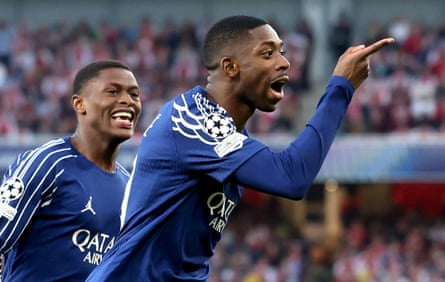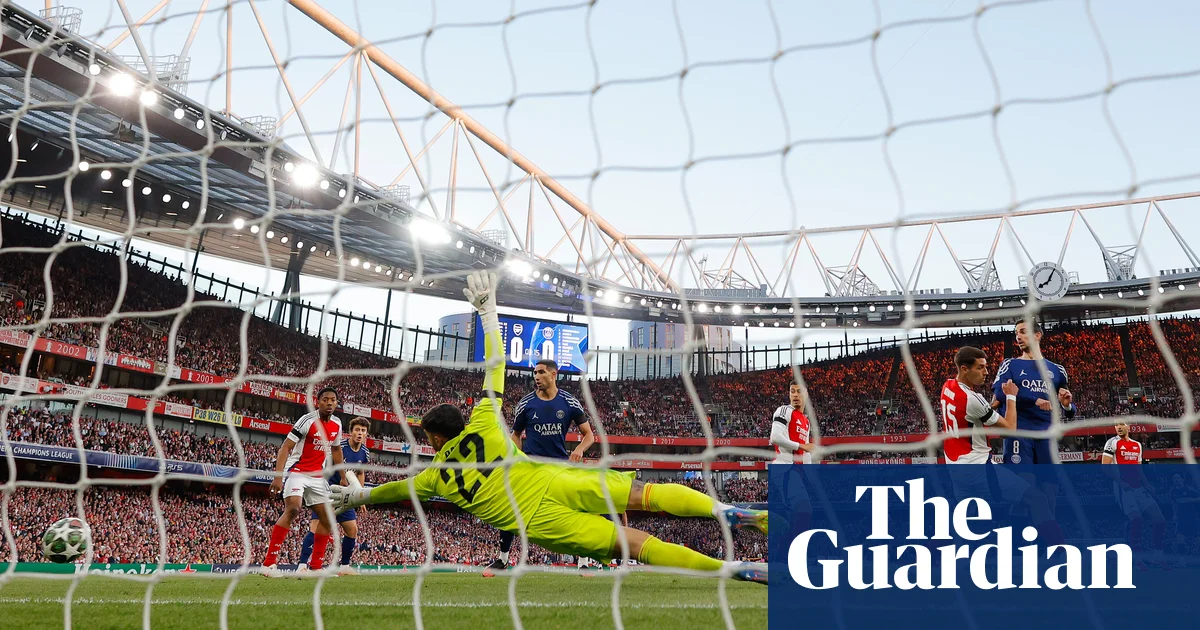For Paris Saint‑Germain, the final whistle arrived like an orchestral fanfare. Exhausted, sweat-drenched players sank to their knees; emotional embraces were shared; the knot of visiting fans in the south-east corner of the Emirates flung scarves in the air and noisily serenaded an epic, razor-thin triumph. It was at this point that Ousmane Dembélé re-emerged from the bench and strolled across the pitch, wearing flip-flops.
And as visual motifs go, this one felt pleasantly on the nose. Of course Dembélé’s work here was long since done: an early goal to settle the game before being withdrawn by Luis Enrique on 70 minutes with a hint of a knock. And yet, on a night defined by screeching and suffering, brusque tackles and hard lines, Dembélé somehow managed to elevate himself above the fracas, the only man playing the game on the easy setting.
It was a victory that Paris clearly deserved, and on a stylistic as much as a sporting level. Naturally Arsenal huffed and fumed at the Slovenian referee, raged into the still-warm night at this decision or that. All of which somewhat overlooks the fact that Premier League physicality is not some kind of Europe-wide gold standard, that there are degrees of interpretation when it comes to acceptable levels of contact.
And perhaps it is little surprise, given its relentless pursuit of athleticism and physical margins, that Premier League teams occasionally look so blindsided when they come up against a genuinely elite technical side, full of genuine invention and tactical sleights, full of fun players who seek not to win the contact but to avoid it altogether. And Dembélé, for all his star power and cutting edge, is also the key to this elusiveness.
Watch as PSG build out, the ball distributed to the full-backs, Dembélé dropping deep from the centre-forward position, sometimes deeper even than the midfielders, deeper than any opposition marker can dare to follow. Outside him, on either flank, Désiré Doué and Khvicha Kvaratskhelia are high and wide, pinning the full-backs in, preventing them from closing down that space.
Sometimes Fabián Ruiz makes the decoy run in behind. Sometimes it’s João Neves. Sometimes, instead, Dembélé will tack wide into the channels, creating an overlap outside him and a vacuum inside him. And the key is that these are combinations and movements that have been drilled and drilled, an intricate system of pulleys and weights and triggers calibrated to take defences out of their comfort zone, to give them more problems than they can handle at once.
Perhaps this is what a good coach can do with good players when you have the luxury of treating large parts of your league season like a kind of training session. Certainly there was a kind of rehearsed chaos to Paris in those opening minutes as they ran the ball up the pitch, Dembélé dropping deep, finding Kvaratskhelia – pass a little ragged, but he’ll work with it – lurking on the edge of the area for the return, and then bundling it in on the bounce.
It felt routine, almost elementary, and yet the curiosity is that it may just have been the most important goal of Dembélé’s career. It is one of the curiosities of a player who has won five league titles and a World Cup that so few of his goals have felt genuinely instrumental. His record for France: seven goals in 55 games, three of them in friendlies, two of them in the Nations League, the others against Kazakhstan and Gibraltar.

Ousmane Dembélé celebrates the most important goal of his career. Photograph: Neil Hall/EPA
There was a winner against Bayern Munich in the German Cup semi-final, which with all due respect to the German Cup, is the German Cup. Handy contributions in the Champions League here and there. But nothing in a game of this magnitude. And so for Dembélé this felt like a kind of graduation, the point at which he finally scaled the higher mountains for which he has so long seemed destined.
skip past newsletter promotion
Sign up to Football Daily
Kick off your evenings with the Guardian’s take on the world of football
Privacy Notice: Newsletters may contain info about charities, online ads, and content funded by outside parties. For more information see our Privacy Policy. We use Google reCaptcha to protect our website and the Google Privacy Policy and Terms of Service apply.
after newsletter promotion
The transformation has been deceptively swift. It was only seven months ago that Dembélé was left out of the Paris squad that visited Arsenal in the group phase, punished for persistent discipline breaches. There was some talk that as Luis Enrique was trying to build a hungry new PSG, Dembélé was still part of the decadent old.
And with this in mind Dembélé enjoys a curious kind of status in this squad: its last genuine matinee idol, certainly the only one who could walk down a London street and count on being recognised. Far from rendering him obsolete, it has lent him a curiously totemic quality. There was a moment early on when he chased down David Raya, chased down Declan Rice, chased down William Saliba, one guy somehow occupying three Arsenal players on his own. And no shade on Kylian Mbappé, right, but he’s not doing that in a million years.
Clearly this tie is not yet over. Perhaps Arsenal poached themselves in their own madness a little here, trying to ride the warm summer vibes and break open a game that demanded circumspection. Perhaps the stark simplicity of their task next week will focus them a little. Perhaps they will even give Dembélé a proper game. But they’ll need to find him first.
